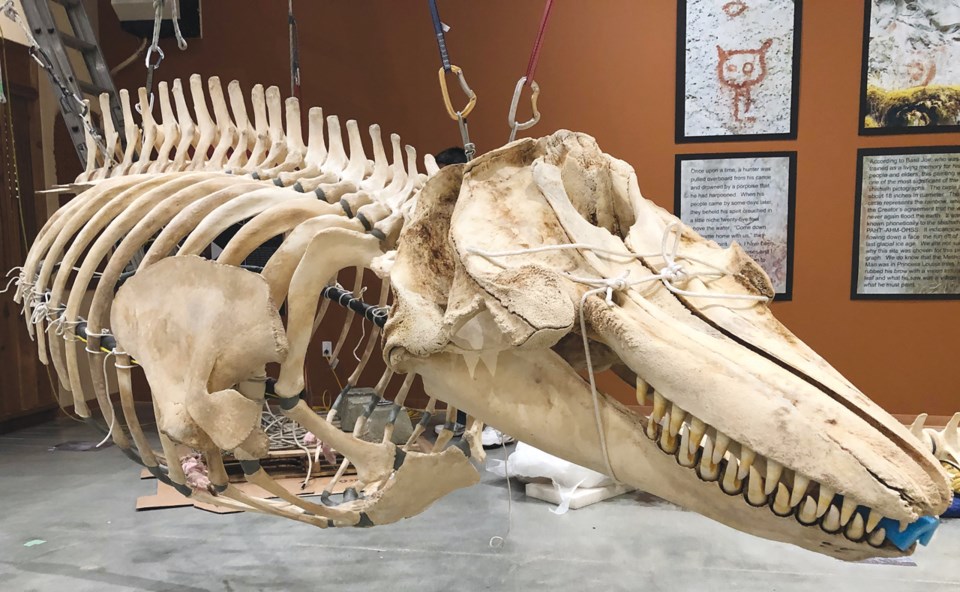Kwentens ?e te sinkwu [Guardian of the Sea] is the new name of the southern resident killer whale formerly known as J34, and the tems swiya Museum in Sechelt is where his skeleton will rest.
Four years after the orca’s body was recovered from the waters off the Sunshine Coast, its skeletal reconstruction is now an exhibit at the shíshálh Nation museum. Weighing 450 pounds and approximately 22 feet (6.7 metres) long, the skeleton is all that’s left of the large male orca that swam with his pod in Georgia Strait.
“It’s amazing to see,” said museum curator ch’elkwilwet Raquel Joe. “We’re hoping this will be a great opportunity for us to encourage people to learn and care about the natural resources of our swiya [traditional territory].”
The dead whale was found floating near the Trail Islands on Dec. 20, 2016. A shíshálh fisherman attempted to recover its body with his gillnet vessel, Sechelt Renegade, but the effort was postponed as darkness fell. Staff from Fisheries and Oceans Canada, coast guard and volunteers from local airlines engaged in the search and the body was towed to a breakwater at Selma Park the next day.
A preliminary necropsy attributed the whale’s death to blunt force trauma to the dorsal side that could have been caused by a boat. The whale was 18 years old and was a member of the J pod group of the southern resident killer whale population, which is “facing imminent threats to their survival and recovery,” according to the Department of Fisheries and Oceans Canada. The whales range from Alaska to California and spend their summers in the waters off the southern tip of Vancouver Island, including Georgia Strait where Trail Islands are located.
kwentens ?e te sinkwu was one of seven to die in 2016, one of the pod’s worst years in terms of mortality in two decades. It is rare to be able to locate and easily recover the body of a deceased whale from the southern resident population, which numbers 74.
“It’s quite special just to have one of the southern residents here in Sechelt,” said Mike de Roos of Cetacea Contracting Ltd., the company that articulated the whale’s skeleton. De Roos’s family-run business is one of very few of its kind in Canada, making the story of his involvement in the project exceptional. “It was really a moment of serendipity,” de Roos told Coast Reporter.
He happened to be visiting the Sunshine Coast last December – one of only a handful of trips in the past decade. On the way over a pod of killer whales skimmed along the water with the ferry.
As de Roos described it, near the end of his visit, “a friend sent a text saying, ‘what’s with the dead whale on the beach?’ since I have this odd business of preparing dead whales for museums.”
De Roos attended the site and worked with shíshálh Nation staff, the DFO and Vancouver Aquarium, among others as they prepared the body. “I was totally blown away,” he said of the experience.
Shíshálh Nation then began considering whether to salvage the skeleton. Once they secured the funding, the Nation contracted de Roos’s business for the project.
Following the necropsy, the skeletal remains of the carcass were buried in a compost heap at a Salish Soils site, where it decomposed for nine months. They were then transported to de Roos and Main’s workshop on Salt Spring Island, where it took another eight months to clean the bones and three months to restore the skeletal structure. The museum installation was completed at the end of March.
“The Strait of Georgia is their core home range, he is right at home there,” said de Roos. “He swam right up and down those waters since he was a baby.”
The exhibit will be open to the public starting Monday, April 15.
– With files from Sean Eckford




